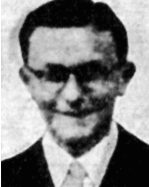 Meir Silber, the son of Devorah-Esther and Abraham, was born in Libova, Latvia, on 18th August 1927. When still an infant, his parents immigrated to South West Africa, and a few years later they settled in the city of Port Elizabeth in the Cape Province. There Meir completed his matriculation at the prestigious Grey High School. An early member of the Betar Jewish youth movement, he became its local officer.
Meir Silber, the son of Devorah-Esther and Abraham, was born in Libova, Latvia, on 18th August 1927. When still an infant, his parents immigrated to South West Africa, and a few years later they settled in the city of Port Elizabeth in the Cape Province. There Meir completed his matriculation at the prestigious Grey High School. An early member of the Betar Jewish youth movement, he became its local officer.
He enrolled in the engineering faculty of Witwatersrand University in Johannesburg. He awoke to the idea and hope of emigrating to Eretz Israel as a pioneer, and in preparation for this goal, he joined a farm on the outskirts of the city.
On the eve of the local Zionist Congress elections which laid out the foundations of a proposed Jewish State, he left the farm, returned to Johannesburg and devoted all his time and energies to the local campaign; he also acted as a correspondent for his movement’s newspaper.
In mid-1946, then a second-year student at university, his heart was set on settling in the Holy Land. Silber, then 19 and an only son, had respected his parents’ wishes to complete his degree first. Later that year he was selected for the ambitious overland safari trip to Palestine, but again his parents stated that they were not against him going to Israel, “but not yet.” He did gain one victory: he returned to Port Elizabeth to take charge of the Eastern Cape Province office of the United Zionist Revisionist Party.
Having respected his parents’ wishes twice, the fire still burned in his bones. He pressured his parents with his wish to resume his academic studies, but this time at the Hebrew University of Jerusalem; the plan was to leave South Africa at the end of 1947.
He reached Eretz Yisrael on 22nd December 1947, and became a student of the Hebrew University of Jerusalem. He also acted as local correspondent for the South African Revisionist newspaper “The Jewish Herald.” Before leaving South Africa, in his farewell address he included the words, “It is better to die on the earth of our homeland than to live in the Diaspora.” It was not long before he joined the ranks of Etzel and became active in their publicity department. He also completed an officers’ training course.
He was killed on 25th May 1948 in the desperate fighting to defend Kibbutz Ramat Rachel on the southern outskirts of Jerusalem. The stand of the 65 Etzel men under the command of Yehuda Lapidot shattered the dream of Egyptian Colonel Ahmed Abd-el-Azis to win immortality as the conqueror of Jerusalem. The Etzel group had been granted permission to defend Ramat Rachel by the Haganah command of Jerusalem.
Meir Silber was buried at Sheikh Badar “A” and on 10th September 1948 his body was re-interred and laid to rest in the Mount Herzl military cemetery.
Source: Translated from the Yizkor website by Joe Woolf with additional information taken from Henry Katzew’s book “South Africa’s 800.”
MEIR “MATEY” SILBER
Letter of Condolence from Mr. G.E. McGrath of Port Elizabeth, South Africa, on the death of Meir “Matey” Silber killed on May 25, 1948 in the desperate fighting for Kibbutz Ramat Rachel in Jerusalem
Matey Silber, age 21, an only child, was killed on May 25, 1948 in the fight for Kibbutz Ramat Rachel in Jerusalem. A product of the elite Greys College, he left his mark on non-Jews as well as Jews. One of the letters of consolation received by his family was from a Mr. G.E. McGrath of Port Elizabeth, who wrote with rare compassion and insight.
“I have just heard of your sad loss and I hope you don’t mind my writing to you. I am not of your faith but feel so deeply about Matey that I am compelled to write to you. He was such a fine boy and so full of ideals and hopes for the future of the Jewish home that in his own way he is as much a Messiah as any previous human being on earth can claim to be…
You have at least a pride that is given to very few people on earth. No man can ask more than to give his life for the faith and ideals in which he believes. If there is such a thing as an after-life, I am confident that Matey himself is content… and apart from your grief would not have things changed on iota.
In his sacrifice he has earned the respect of all right-thinking men. While such as he are born into the world, we can all have hopes for the future of mankind. In my heart I feel that you yourselves can look forward with confidence to the future and take your place with pride and courage in the ranks of those who have sacrificed their most precious possession for the future not only of the Jewish race but of all who love right and justice.
Perhaps in this honest pride and the conviction that Matey’s sacrifice was not in vain, you might take a measure of consolation in your loss. In the future when the aspirations for which Matey sacrificed himself have been realized and the Jews of the world have gained in stature and dignity for the blessing such as he have brought them, you too might be assured the sacrifice was in truth worth while.”

